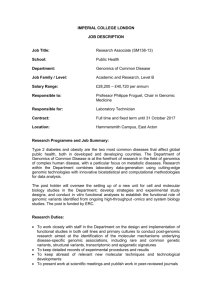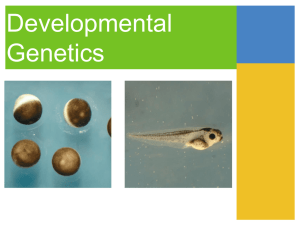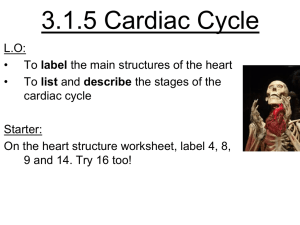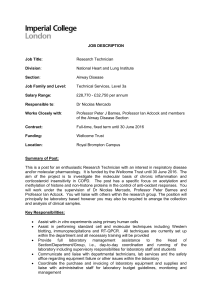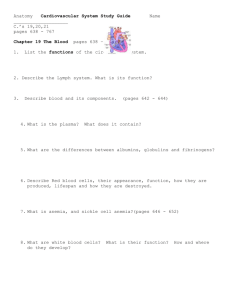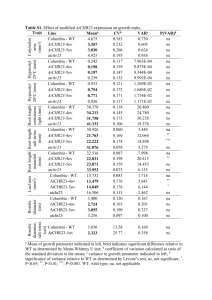JOB DESCRIPTION Job Title: Research Associate Division: National
advertisement
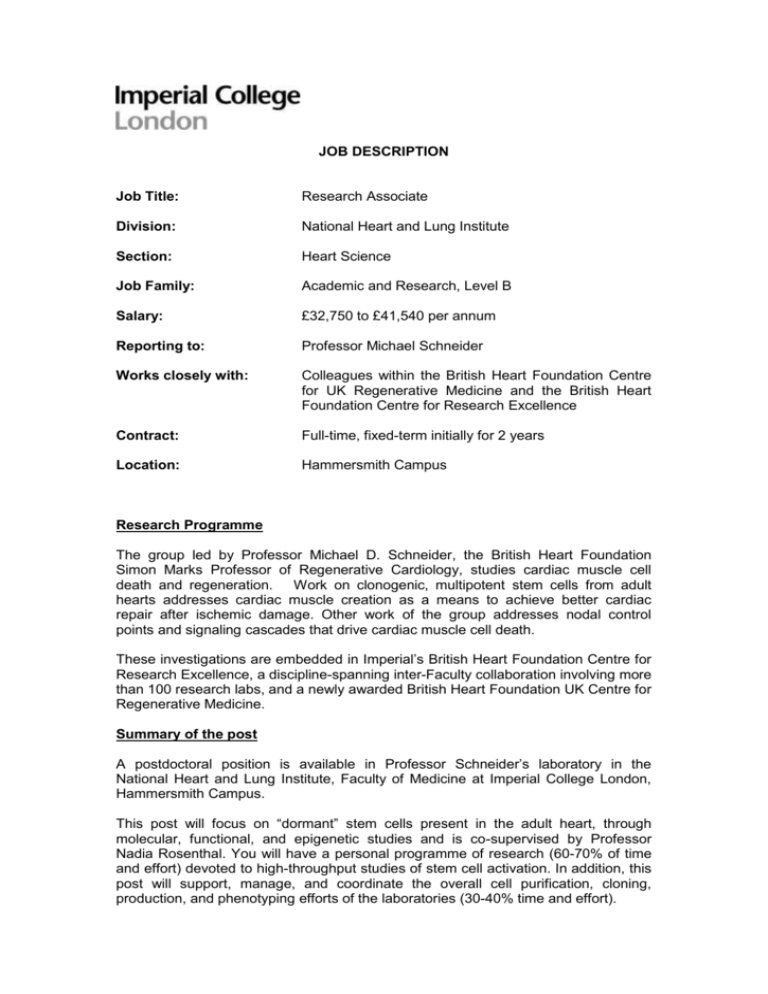
JOB DESCRIPTION Job Title: Research Associate Division: National Heart and Lung Institute Section: Heart Science Job Family: Academic and Research, Level B Salary: £32,750 to £41,540 per annum Reporting to: Professor Michael Schneider Works closely with: Colleagues within the British Heart Foundation Centre for UK Regenerative Medicine and the British Heart Foundation Centre for Research Excellence Contract: Full-time, fixed-term initially for 2 years Location: Hammersmith Campus Research Programme The group led by Professor Michael D. Schneider, the British Heart Foundation Simon Marks Professor of Regenerative Cardiology, studies cardiac muscle cell death and regeneration. Work on clonogenic, multipotent stem cells from adult hearts addresses cardiac muscle creation as a means to achieve better cardiac repair after ischemic damage. Other work of the group addresses nodal control points and signaling cascades that drive cardiac muscle cell death. These investigations are embedded in Imperial’s British Heart Foundation Centre for Research Excellence, a discipline-spanning inter-Faculty collaboration involving more than 100 research labs, and a newly awarded British Heart Foundation UK Centre for Regenerative Medicine. Summary of the post A postdoctoral position is available in Professor Schneider’s laboratory in the National Heart and Lung Institute, Faculty of Medicine at Imperial College London, Hammersmith Campus. This post will focus on “dormant” stem cells present in the adult heart, through molecular, functional, and epigenetic studies and is co-supervised by Professor Nadia Rosenthal. You will have a personal programme of research (60-70% of time and effort) devoted to high-throughput studies of stem cell activation. In addition, this post will support, manage, and coordinate the overall cell purification, cloning, production, and phenotyping efforts of the laboratories (30-40% time and effort). The molecular studies include qRT-PCR, single-cell qRT-PCR, immunophenotyping of dormant cardiac stem cells from mice and humans. and The studies include (1) high-throughput screens to activate cardiac markers’ expression, using pre-spotted chemical and genetic libraries from the laboratory of Mark Mercola, as well as other triggers, (2) longer-term culture for biophysical assays by Professor Sian Harding and others, (3) collaborative efforts with the Rosenthal lab to improve the extent and effectiveness of stem cell grafting by manipulation of inflammatory and anti-inflammatory pathways, (4) epigenetic studies conducted chiefly in the laboratories of Tim Aitman and Ana Pombo. The position is laboratory based and will involve responsibility for cardiac stem cell cloning, production, activation, and phenotyping. You will be expected to submit publications to refereed journals and to contribute to attracting external research funding. You will have a PhD in cell biology, molecular biology or a related field. You will be a highly motivated scientist with demonstrable research laboratory experience and an established record of hands-on experience with cardiac stem cell molecular biology. Key Responsibilities You will conduct research on cardiac stem cell biology and regeneration. The techniques employed for the research will include: Cardiac stem cell purification, cloning, and production (supported by other personnel for FACS and robotic cell culture) qRT-PCR Single-cell qRT-PCR Immunophenotyping Analyses of heart tissue after injury and grafting Analyses of donor cells recovered from the heart after grafting Research Duties: To conduct and plan own scientific work, responsible for all aspects of cardiac cell culture and molecular phenotyping To maintain highly organised and accurate record of experimental work To conduct data analysis, ensuring the validity and reliability of data at all times To contribute to the smooth running of the Group’s laboratory and facilities with other scientists, clinicians, technicians and students within the laboratory To participate in Group research meetings and internal seminars To collaborate with other allied scientists within Imperial College and elsewhere in London and abroad, as appropriate To supervise or assist in the supervision of undergraduate and postgraduate research students and research assistants as required To maintain the highest standards of Research Governance and Ethics To co-operate with other members of Imperial College working in the National Heart and Lung Institute, in other schools/institutes/departments of the Faculty of Medicine, and elsewhere within Imperial College To contribute where applicable to the planning of development in research and teaching To publish in high quality journals and to present data at national and international meetings To present findings to colleagues and at conferences To attend relevant workshops and conferences as necessary To comply with the College, Division, and Unit safety practices and to attend courses on safety when appropriate. Other Duties: To undertake appropriate administration tasks To undertake any necessary training and/or development To promote the reputation of the Group, the Department and the College Any other duties as may be deemed reasonable by Head of group as well as Head of Division/Department/Section. To observe and comply with all College policies and regulations, including the key policies and procedures on Confidentiality, Conflict of Interest, Data Protection, Equal Opportunities, Financial Regulations, Health and Safety, Imperial Expectations (for new leaders, managers and supervisors), Information Technology, Private Engagements and Register of Interests, and Smoking. To undertake specific safety responsibilities relevant to individual roles, as set out on the College Website Health and Safety Structure and Responsibilities page (http://www3.imperial.ac.uk/safety/policies/organisationandarrangements). Job descriptions cannot be exhaustive and the post-holder may be required to undertake other duties, which are broadly in line with the above key responsibilities. Imperial College is committed to equality of opportunity and to eliminating discrimination. All employees are expected to adhere to the principles set out in its Equal Opportunities in Employment Policy, Promoting Race Equality Policy and all other relevant guidance/practice frameworks. IMPERIAL COLLEGE LONDON PERSON SPECIFICATION Qualifications: Essential PhD or equivalent level of professional qualification in the molecular or cellular life sciences, or equivalent field Knowledge and Experience: Essential Strong background in cell biology, including stem cell biology Demonstrable experience at post-doctoral level in molecular cell biology including qRT-PCR and immunocytochemistry Experience with advanced laboratory robotics, preferably automated cell culture Knowledge of research methods and statistical procedures Practical experience within a research environment, preferably through publication in relevant and refereed journals Desirable Knowledge of cardiac stem cell biology and regenerative medicine Experience with robotic cell culture Experience with cell cloning Experience with immunostaining and fluorescence microscopy techniques Experience with the use of imaging software Experience in high content imaging Experience in single-cell qRT-PCR Experience in publishing high-quality peer-reviewed papers Skills and Abilities: Preparation of cells and RNA samples Performing qRT-PCR and single-cell qRT-PCR Planning and interpretation of flow cytometry experiments Ability to conduct a detailed review of recent literature Ability to develop and apply new concepts Creative approach to problem-solving Excellent verbal communication skills and the ability to deal with a wide range of people Excellent written communication skills and the ability to write clearly and succinctly for publication Computer literate with a good knowledge of different computer programmes with experience in data presentation and statistical analyses Computer skills including word-processing, spreadsheets and the Internet Ability to take a flexible attitude towards work Ability to organise own work with minimal supervision Ability to prioritise own work in response to deadlines Ability to direct the work of a small research team and motivate others to produce a high standard of work Ability and willingness to work as part of a team and to be open-minded and cooperative Ability to show discipline and regard for confidentiality and security at all times Other: Willingness to undertake any necessary training for the role Willingness to travel both within the United Kingdom and abroad to conduct research and attend conferences Willingness to work out of normal working hours (including weekends) if the requirements of the project demand Discipline and regard for confidentiality and security at all times

